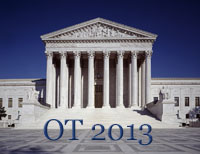Technology at the Court: Riley and Aereo
Like the legal profession generally, the United States Supreme Court has a reputation as slow to embrace new technologies. For example, Justice Kagan shared in an interview last year that the Justices rarely use email. Yet at the end of the recent term, the Court decided cases affecting two evolving technologies: cell phones and streaming video services. Unanimous in the judgment in Riley v. California, the Court held that the search incident to arrest doctrine does not allow police officers to search through the contents of an arrestee’s cell phone without obtaining a warrant. In American Broadcasting Companies v. Aereo, the Court concluded that a provider of video streaming services engages in a public performance and infringes copyrights by using dedicated antennae to capture broadcast signals and then transmit them to subscribers over the internet. However, in the opinions in these cases, the Justices seem careful to avoid allowing any personal unfamiliarity with cell phones or with Aereo’s streaming service to affect the quality of their decisions. Instead, the Justices confront the technologies in a pragmatic manner, focusing on the functions easily accessible to average users and avoiding analysis of underlying technological details.


